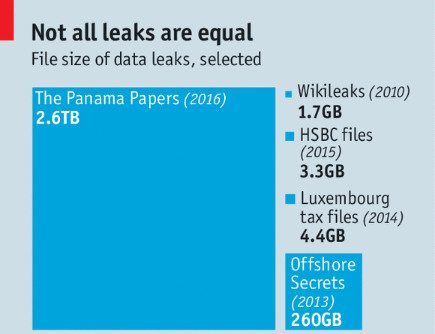The “Panama Papers” — 11.5 million files, 2.6 terabytes of digital information in what one newspaper called “history’s biggest data leak”.
The International Consortium of Investigative Journalists commented that a system exists that enables crime, corruption and wrongdoing to operate through hidden offshore companies. The release of this information exposed many prominent world leaders, as well as hundreds of their associates.
Source: https://www.youtube.com/watch?v=7VfBd-yL0hI
Cyber leaks have become increasingly larger over the past decade, highlighting the opportunities presented by the digital revolution.

Source: http://www.bullionreserve.com/news-insights
New digital platforms enable everyone to collect and share data online. In the digital age, where stories break online, it can be used by journalists as a tool to efficiently seek and present the truth.
“Data journalism is a new set of skills for searching, understanding and visualizing digital sources in a time that basic skills from traditional journalism just aren’t enough. It’s not a replacement of traditional journalism, but an addition to it.” Jerry Vermanen
For regional and rural journalists, who are often limited by resources, data can be effectively used to custom stories to their audience. Online data can also act as a lead, prompting a more thorough investigation. Reporting on rates of hospital infection or NAPLAN test results for example, have the potential to highlight faults within the health and education systems, but is often justified in the public interest.
With the 9 September NSW Council elections, data journalists will report the figures as counting commences as early as 6pm on election night. In this regard, the data analyses is important to both the candidates and to the public.
But, should privacy be protected, or does public interest justify leaking documents?
WikiLeaks exposed killings, torture and corruption as well as abuses in banking and taxation. Through an invasion of privacy, CCTV was used to identify the Boston Marathon terrorists.
In contrast, the phone hacking scandal by journalists at the Murdoch-run News of the World, served no public interest, and was simply viewed as an abuse of privacy.
Data journalism should provide transparency, accountability and justice.
Seattle Times Journalists, Cheryl Phillips, said when the truth is suppressed or distorted, corruption and injustice can flourish.
“Without data, connections between powerful people or entities would go unrevealed, deaths caused by drug policies that would remain hidden, environmental policies that hurt our landscape would continue unabated. But each of the above was changed because of data that journalists have obtained, analyzed and provided to readers.”
Data journalism is simply an extension of investigative journalism, in that it aims to investigate, uncover, and present the truth.
References:
BBC News (2012) Q&A: News of the World phone hacking scandal. BBC News 4 August 2012 [available] http://www.bbc.com/news/uk-11195407
Dalzell, S. (2016) NAPLAN results show literacy, numeracy skills have stalled despite record funding. ABC News 3 Aug 2016 [available] http://www.abc.net.au/news/2016-08-03/naplan-results-show-literacy-numeracy-skills-have-stalled/7683244
Financial Times (2016) The Panama Papers in 90seconds. Youtube video [available] https://www.bing.com/videos/search?q=impact+of+the+panama+papers&&view=detail&mid=01CB760A0D45ACBA0F1F01CB760A0D45ACBA0F1F&FORM=VRDGAR
Harding, L. (2016) What are the Panama Papers? A guide to history’s biggest data leak. The Guardian 5 April 2016 [available] https://www.theguardian.com/news/2016/apr/03/what-you-need-to-know-about-the-panama-papers
International Consortium of Investigative Journalists (2016) Giant Leak of Offshore Financial Records Exposes Global Array of Crime and Corruption [available] https://panamapapers.icij.org/20160403-panama-papers-global-overview.html
Open Knowledge Foundation (n.d.) Data Journalism Handbook [available] http://datajournalismhandbook.org/1.0/en/introduction_2.html
Pegg, D. (2016) The Panama Papers fallout: banana protests, paltry fines and a PR problem. The Guardian December 21 2016 [available] https://www.theguardian.com/world/2016/dec/21/panama-papers-fallout-banana-protests-fines-iceland-uk-david-cameron